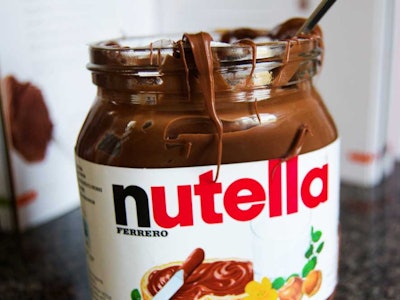
The maker of Nutella recently went on the air in its native Italy to defend its use of palm oil after European regulators suggested the ingredient could contain a carcinogen.
Reuters reports that Ferrero spent the past three months advertising on TV and in print to declare that its palm oil "is safe because it comes from freshly squeezed fruits and is processed at controlled temperatures."
The European Food Safety Authority warned last year that palm oil, when refined at high temperatures to eliminate color and aroma, generates a higher levels of glycidyl fatty acid esters.
The contaminant, commonly known as GE, is considered a possible carcinogen, and the findings prompted companies and groups across Italy to limit or call for bans on palm oil.
Ferrero, however, countered that its palm oil is processed at just less than 200 degrees Celsius and at low pressure. The system takes longer and costs more, but officials said that scientific instruments subsequently had trouble identifying GE.
The company also argued that changing the formula would raise its costs and compromise the iconic product.
"Making Nutella without palm oil would produce an inferior substitute for the real product," Ferrero purchasing manager Vincenzo Tapella told the publication.
The ad campaign — the most vocal effort regarding palm oil by a major food company in Europe — could be a boon to the palm oil industry, particularly after years of criticism from environmental advocates that the industry also led to deforestation.
"It is good that Ferrero has clarified that the palm oil they use is safe and sustainable," Yusof Basiro, head of the Malaysian Palm Oil Council, told Reuters. Top producers in Malaysia and neighboring Indonesia make much of the world's palm oil supply.
Reuters noted that official guidance regarding GE from the European Commission is expected this year. The agency could limit the compound, but it is not expected to ban it outright. The EFSA's findings — and similar conclusions from the World Health Organization and a UN agency — did not suggest that consumers avoid palm oil, and the ingredient is not restricted in the U.S.






















